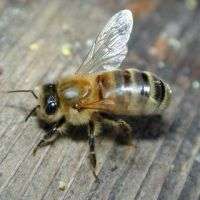Aggressive bees may track future of flying robots

Angry bees that fly like mini-missiles could map the futures of unmanned aircraft and planetary explorer robots, thanks to new University of Queensland research backed by the Queensland Government.
Professor Mandyam Srinivasan, Professor of Visual Neuroscience at UQ's Queensland Brain Institute, will lead a $2.5 million project aiming to improve robot technology including unmanned aerial vehicles (UAVs), through better understanding of bee behaviour. Professor Srinivasan is winner of the $1.25 million 2007 Smart State Premier's Fellowship, which is matched by funding from UQ.
“Professor Srinivasan's unique marriage of biology and engineering will help to put Queensland on the map at a time where enhanced surveillance and security are key priorities for governments and leaders around the world,” Queensland Premier Peter Beattie said when announcing the award today.
Professor Srinivasan and his team have spent more than two decades unlocking the mysteries of bee vision and navigation, and are now investigating how bee emotions, particularly aggression, can improve robotics.
Research of aggressive bees is unprecedented, he said. Worker bees are generally docile – until a guard bee protecting the hive emits an alarm hormone to signal the hive is endangered.
“Normal bees are fairly peaceful when they go out hunting for food, but the moment they get a whiff of alarm pheromone from a guard bee the entire colony mobilizes.
“The flight dynamic changes and they become like little fighter aircraft or missiles,” Professor Srinivasan said.
Bees' small but smart brains and nervous systems have evolved a “visuomotor” system that enables them to track moving objects with pinpoint accuracy.
Professor Srinivasan's research has previously been funded by NASA and now has funding from the US Airforce, and its practical potential is diverse.
It could be used for aerial coastal surveillance, weather monitoring and minerals exploration. The technology also has potential to reduce the risk to soldiers involved in peace-keeping and combat situations, who might one day have portable UAVs to send on reconnaissance missions.
The research could also lead to planetary explorer robots that are able to behave autonomously, in the same way as insects. This would be much more effective than robots controlled remotely from Earth, given a long signal delay between Mars and Earth, Professor Srinivasan said.
Professor Srinivasan is the second UQ researcher to be awarded the Smart State Premier's Fellowship, which is now in its second year. Professor Ian Frazer, Director of UQ's Diamantina Institute for Cancer, Immunology and Metabolic Medicine, who co-invented the world's first vaccine for cervical cancer, became the first Fellow in 2006.
Source: UQ





















